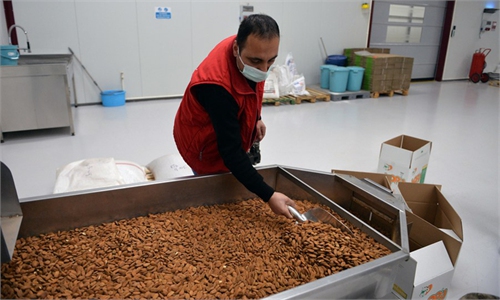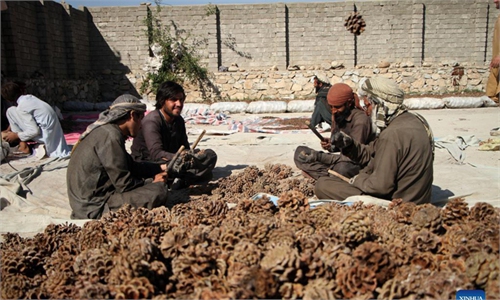China continues to offer aid, agricultural trade with Afghanistan to help handle humanitarian crisis, drive economic mobility

Live streamer Li Jiaqi (right) works with CCTV reporter Wang Bingbing (center) to sell 120,000 cans of pine nuts from Afghanistan on November 6, 2021. Photo: VCG
China is taking concrete actions to help the Afghan people by offering humanitarian aid and maintaining an "air corridor" for agricultural trade, as Chinese Ambassador to Afghanistan Wang Yu tweeted on Sunday that a train with more than 1,000 tons of humanitarian aid departed China's Xinjiang region, heading to Afghanistan. Experts called for more countries to help the war-torn country since its humanitarian crisis is growing with temperatures falling and more people suffering from starvation.
"Train with more than 1,000 tons humanitarian aid departed China's Xinjiang. Includes naan, milk tea powder, cotton-padded clothes, cotton shoes and blankets. Since July 2021, the China-Afg trains carried more than 2,600 tons of humanitarian aid to Afg," Wang tweeted.
Previously, Wang posted pictures of the arrival of the first batch of aid, mainly warm materials such as blankets and cotton clothes, on September 30. On November 1, he released information on another batch of emergency humanitarian aid departing China and said "Overcome the difficulties together with Afg people."
The Global Times learned that the batch of aid mentioned by Wang on Sunday will be transferred to Hairatan, a town along the Uzbekistan-Afghanistan border, and then transported by vans in Afghanistan.
Currently, a few countries, especially China, and UN organizations, are taking actions to help the Afghan people as the humanitarian crisis continues to grow in the country with the upcoming winter, said Zhu Yongbiao, director of the Center for Afghanistan Studies in Lanzhou University, citing data from the UN that said that the situation in the war-torn country is "worsening" and funding for emergency aid is urgently needed to help 20 million people.
Zhu told the Global Times that children in some places in Afghanistan are suffering from malnutrition and lack of medical treatment. Some families, suffering from starvation, even sold their children.
"The situation is urgent, but aid from Western countries and the US still remains just talk. Instead of directly helping people in Afghanistan, they prefer to put their money in neighboring countries to prevent refugees from going to the EU," Zhu said.
Aside from offering humanitarian aid, China has also started an "air corridor" for agricultural trade with Afghanistan, which Zhu said would increase Afghan farmers' income and drive economic mobility in Afghanistan, promoting domestic economic development.
After the first batch of Afghan pine nuts arrived at Pudong Airport in Shanghai on November 1, the second batch of more than 40 tons of pine nuts was transferred by the "air corridor" to Shanghai, the Global Times has learned.
Wang tweeted on Sunday that so far, there have been 10 flights carrying Afghan pine nuts to China and flights will continue, with dry fruits the next priority.
"China will unswervingly expand opening-up, and share its development opportunities with Afg & wider world," the Chinese ambassador wrote.
China has always worked to promote Afghanistan's agricultural products, including almonds and saffron, for export to China to help increase the income of Afghan people, the Global Times has learned.
Salman Raha, an Afghan businessman who lives in Yiwu in East China's Zhejiang Province and has paid attention to agricultural trade, hailed China's move of starting direct flights for agricultural trade, saying that these would also help increase Afghan people's income.
China's e-commerce live streamer Li Jiaqi worked with CCTV reporter Wang Bingbing to sell 120,000 cans of pine nuts from Afghanistan on November 6, which were valued at more than 10 million yuan ($1.56 million), showing the country's efforts to help the Afghan people to overcome economic difficulties.




